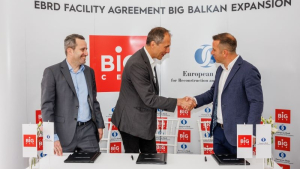
Deutsche Pfandbriefbank AG (pbb) concluded the 2021 financial year with a pre-tax profit of €242 million, thereby exceeding by 60% the previous year’s results, which were burdened by the COVID-19 pandemic.
Besides a further increase in net interest and commission income, to €502 million (2020: €482 million), the good result was also driven especially by high prepayment fees, which caused net income from realisations to rise to €81 million (2020: €26 million). Lower burdens on net income from risk provisioning (€-81 million; 2020: €-126 million) and a recovery in net income from fair value measurement (€10 million; 2020: €-8 million) also contributed. Due to higher expenses for expanding the business, pbb is aiming for profit before taxes of between €200 million and €220 million for 2022, and therefore in line with the level seen in the last few years since the IPO. pbb wants to grow its core business organically in the years ahead.
CEO Andreas Arndt commented: “With profit before taxes of €242 million, 2021 was an extremely successful year for pbb. We want our shareholders to benefit from this success, with a dividend of €1.18 per share.” He noted that pbb clearly exceeded the recent years’ earnings levels of around €200 million in 2021, not least thanks to favourable developments, despite having further bolstered risk provisioning in the form of management overlays. “We will employ a series of measures to sustainably strengthen our earnings base in the coming years. In this respect, we will still regard at least 2022 as a year of investment for pbb,” said Mr Arndt. He added that the pre-tax profit of between €200 million and €220 million targeted for 2022 also reflects a challenging interest rate environment but does not include reversals of the management overlay in risk provisions. Mr Arndt said that whilst he does not anticipate any direct impact of the geopolitical situation on pbb, he envisages uncertainty as to the general economic development as a result.
Commenting on the current geopolitical situation, Arndt said: "We currently see no immediate impact on pbb. Therefore, we are sticking to our plans for 2022 and the following years despite the uncertainty regarding the general economic development. If the war continues or the situation worsens, new conditions will probably apply."
After taxes of €14 million and taking into account the coupon of €17 million for pbb’s Additional Tier 1 (AT1) capital, €212 million or €1.58 per share is attributable to ordinary shareholders. In line with its dividend policy, pbb intends to distribute 50% as dividends and 25% as special dividends to its shareholders; in other words, a total of €159 million or €1.18 per no-par value share entitled to dividends. The Management Board and the Supervisory Board will submit a corresponding proposal to the Annual General Meeting on 19 May 2022. As it has done in previous years, pbb continues to take into account macroeconomic and sector-specific risks, as well as the regulatory requirements and the communicated target capitalisation levels communicated, including cautious buffers, when setting the ordinary and special dividends. It also takes future investments into consideration.
At €9.0 billion, new business in commercial real estate finance in 2021 exceeded the previous year by more than 20% (2020: €7.3 billion, each including extensions >1 year) and was also significantly higher than the target of €7 billion to €8 billion. As expected, average margins on new business of around 170 basis points (bp) were down slightly on the previous year but remained stable during the year. The commercial real estate finance portfolio grew slightly from year-end 2020, to €27.6 billion (2020: €27.0 billion). Among other things, prepayments contributed to the lower rate of increase relative to the volume of new business.
pbb expects pre-tax profit for 2022 in a range of between €200 million and €220 million, thus aiming for a result in line with the levels seen in recent years, despite incurring expenses for expanding the business and receiving less support from favourable effects, including TLTRO, prepayment fees and floors on lending rates. The Bank expects a higher level of earnings in the coming years, thanks to the implementation of growth initiatives.



